| Srl | Item |
| 1 |
ID:
154253
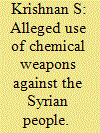

|
|
|
|
|
| Summary/Abstract |
The US has justified the use of military force against the Syrian regime under Bashar al-Assad, after its alleged use of chemical weapons against civilians. However, as long as the UN Security Council does not agree to intervention, unilateral American action is not permissible under the UN Charter. Even the principle of “responsibility to protect” is not justified in this case, as action would most likely be short, punitive and unlikely to end the attacks on Syrian civilians. The use of force rules, originating in customary international law and partially codified in the UN Charter, establish the lawful framework for the initiation of military activity by a government. Humanitarian intervention or a military campaign calculated to stop widespread attacks on a civilian population, including acts of genocide, other crimes against humanity and war crimes is also contested as it is not defined in the UN Charter, although many scholars and activists claim it is supported by the charter's central objective to defend human rights and fundamental freedoms.
|
|
|
|
|
|
|
|
|
|
|
|
|
|
|
|
| 2 |
ID:
154260
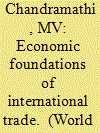

|
|
|
|
|
| Summary/Abstract |
The WTO was created to promote free trade at the Uruguay Round of talks in 1994 when the General Agreement on Tariffs and Trade was transformed into a permanent institution. The WTO is responsible for trade negotiations and disputes and handling national trade policies. Its agreements are endowed with technical assistance for developing countries and it also cooperates with other international bodies on trade related issues. In theory all members have an equal voice in the decision making process. With the increase of global free trade it is crucial that the WTO help speed up world economic activity. This however must be done taking into account cultural, economic and social consequences, particularly with regard to vulnerable groups. Dumping is the practice of selling goods in another country at a considerably lower price. Antidumping rules are deliberate measures that prevent a company from selling goods below cost and cause economic disturbances by shrinking markets.
|
|
|
|
|
|
|
|
|
|
|
|
|
|
|
|
| 3 |
ID:
154258


|
|
|
|
|
| Summary/Abstract |
Although India is hailed as harbouring a green-field competition regime, its competition law jurisprudence is older than many of its counterparts in developing countries. This article traces the evolution of competition law in India, details the economic aspects of competition and anticompetitive behaviour and reviews the challenges of dealing with crossborder competition issues.
|
|
|
|
|
|
|
|
|
|
|
|
|
|
|
|
| 4 |
ID:
154262
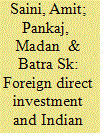

|
|
|
|
|
| Summary/Abstract |
Export growth in a country is associated with several factors including foreign direct investment that significantly contribute to faster export promotion. Since 1991, India's new economic policies have fetched more uninterrupted foreign investment than ever before. Within this framework, this paper measures the effect of foreign direct investment inflow over export promotion. Using annual data series 1991–2012, it investigates the effect of foreign direct investment on export growth in India by using co-integration statics. Results support the theory that export increases manyfold in the long run with foreign direct investment. However according to causality test reports, this is a bi-directional relationship, which suggests export and foreign direct investment are variables that mutually motivate one another.
|
|
|
|
|
|
|
|
|
|
|
|
|
|
|
|
| 5 |
ID:
154257
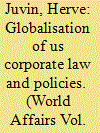

|
|
|
|
|
| Summary/Abstract |
This article raises an alarm about the expanding hegemony of big business promoted by the US and transnational corporations. The global reach of American jurisdiction is being used to exact heavy financial and legal penalties on foreign nations and companies and promote US interests in the name of economic globalisation, as part of the agenda for fi ghting corruption and terrorism. The article highlights the threats to national sovereignty, cultural diversity and economic autonomy posed by the ruling US centric financial system.
|
|
|
|
|
|
|
|
|
|
|
|
|
|
|
|
| 6 |
ID:
154255
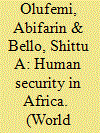

|
|
|
|
|
| Summary/Abstract |
This paper explores the terrain of human security as a primary purpose of governance and contends that the failure of any government to safeguard the security of its citizenry is a failure of governance. It discusses traditional, modern and compromise based views of security. The authors observe that election violence and the “sit tight” syndrome of African leaders have ravaged the continent and kept it backward and poor. They conclude that an adherence to democracy, good governance and the rule of law is the only panacea for human security in Africa.
|
|
|
|
|
|
|
|
|
|
|
|
|
|
|
|
| 7 |
ID:
154263


|
|
|
|
|
| Summary/Abstract |
Regional trade agreements (RTAs) have proliferated in the last few decades in various forms all over the world and now number in the hundreds. In Asia, many came up or were reinforced after the 1997–98 financial crisis. India has signed a number of RTAs (28 as of now) with various Southeast Asian countries and with ASEAN as a whole. Another important development has been India's admission into the Regional Economic Comprehensive Partnership known as ASEAN+6, intended to facilitate Pan-Asian and Asia-Pacific integration, although it poses a risk to Indian industry faced with growing Chinese competition and market penetration.
|
|
|
|
|
|
|
|
|
|
|
|
|
|
|
|
| 8 |
ID:
154254
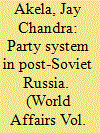

|
|
|
|
|
| Summary/Abstract |
This article describes the principles and features of the party based political system in Russia and analyses the historical process that transformed the country from a single party polity within the Soviet Union into a multiparty democracy. It shows that the last decade of the twentieth century—marked by a proliferation of parties, a fragmentation of society, social decline and political paralysis—was succeeded from 2001 by the ongoing period of the concentration of power in the hegemonic party United Russia led by Vladimir Putin. This socially conservative but economically liberal and reformist party aims to build a middle class capable of supporting a stable democracy.
|
|
|
|
|
|
|
|
|
|
|
|
|
|
|
|
| 9 |
ID:
154264
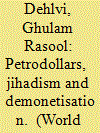

|
|
|
|
|
| Summary/Abstract |
Radical Islamism or jihadism funded by “petrodollars” plays a sinister role in supplying arms to militant Islamist groups around the world and terror financing has indeed become a matter of concern for strategic analysts, particularly those engaged with the monumental task of counterterrorism. In view of the deep-rooted fi nancing of terror in Kashmir, it was hoped that demonetisation would curb the sources of funding in the valley where the ilk of Hizb-ul-Mujahidin collect donations from Pakistan and then route them into the state through hawala operators. This article reviews the effects of the demonetisation process carried out by the Narendra Modi government in 2016 to wipe out black money and its use for terrorism. It concludes that demonetisation is not an effective measure against terrorism and the illicit economy.
|
|
|
|
|
|
|
|
|
|
|
|
|
|
|
|
| 10 |
ID:
154252


|
|
|
|
|
| Summary/Abstract |
According to the mainstream understanding of international relations, security depends on power usually defi ned in terms of military power. As per this logic, when states increase the latter, the former should increase. At the same time, power and security are also considered in relative terms and as zero-sum games—states feel more secure when their neighbours are insecure. This article however questions this logic and argues that states would be more secure when their neighbours feel secure from them and in turn would make others feel more secure by controlling and decreasing their armaments. Thus, going against mainstream theories, this paper argues that states could increase security by reducing defence expanditure. It compares security levels of different states and their defence expenses. It concludes that the security of those that spend larger amounts on their military tends to be lower than it is for those with smaller military budgets and analyses reasons for this paradoxical outcome.
|
|
|
|
|
|
|
|
|
|
|
|
|
|
|
|
| 11 |
ID:
154256


|
|
|
|
|
| Summary/Abstract |
Somalia has the longest coastline in Africa and a wealth of marine resources. However, weak governance, lack of infrastructure and illegal, unregulated and unreported (IUU) fishing by foreign countries have impeded Somali efforts to take full advantage of the economic potential of these resources. The overfishing caused by IUU vessels has decreased the domestic catch, forcing local fishermen to turn to piracy. The increase in piracy has been mirrored by Al-Shabaab terrorist activity. Despite the different motivations of these two groups, profits from piracy have been used to fund terrorist activity and the two groups have become intertwined. This article reviews the case of overfishing in Somalia, its fostering of piracy and explores the link between piracy and Al-Shabaab. It suggests that nationwide economic stability and peace could be furthered with the improved management and development of Somali marine resources.
|
|
|
|
|
|
|
|
|
|
|
|
|
|
|
|